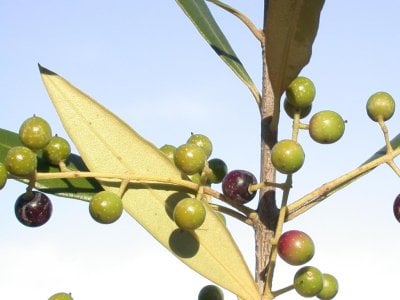Are you living with a 'Ticking Time Bomb'? This Toxic Plant could be behind a whopping $4.3 Billion Catastrophe!
- Replies 8
As Australians, we take immense pride in our unique and diverse natural environment. From the bush to the beaches, our landscapes are an integral part of our national identity. However, lurking in our own backyards, there could be a silent invader contributing to a staggering $4.3 billion problem – invasive weedy garden plants. The Invasive Species Council is sounding the alarm and calling for urgent action to address this ecological 'ticking time bomb'.
The Council's Campaign Coordinator and bush regenerator, Kathleen Herbert, has highlighted the pressing need for a national plan to combat the escape of weedy garden plants into Australia's natural ecosystems. Currently, the self-regulation within the nursery industry is proving ineffective, and government intervention seems to be the only viable solution to this growing issue.
It's a concern that hits close to home for many of us, especially when we consider that hundreds of Australian nurseries, including the hardware giant Bunnings, are stocking plants and seedlings that are known to be highly invasive and damaging to our environment. And they're doing so legally, which is a loophole that the Invasive Species Council hopes to close.

'Everyday Australians can't be expected to know that they're buying a ticking time bomb for bushlands when they go to their local nursery,' Herbert told Yahoo News Australia. 'They shouldn't need a botany degree to know what safe and unsafe plants are.'
The problem isn't isolated to one nursery or a single species; it's a national issue that requires a comprehensive approach. Well-meaning Australians are not to blame – it's an industry-wide problem that demands government regulation. Plants such as English ivy, African olive, seaside daisy, agapanthus, and gazania are just a few examples of these invasive species that are readily available for purchase, often for just a few dollars.
The Minister for Environment, Tanya Plibersek, has committed to developing a threat abatement plan around escaped garden plants, a move welcomed by the Council. However, Herbert emphasizes the need for strong action and resistance to industry pressure to ensure the plan's effectiveness.
Invasive weedy plants can choke and suffocate bushland and waterways, smother native plants, and rapidly take over landscapes. For instance, at Bunnings stores, a packet of gazania flower seeds sells for $5.50, a small price that can lead to large-scale environmental consequences.
The story of Western Australian residents Rod and Gaynor Sherwood is a testament to the severity of the issue. They spent a decade eradicating swarms of arum lilies from their 100-acre property, a toxic species that is still widely sold online in Australia. Their battle is not unique; weed management is a long-term and costly endeavor.
Why is it crucial to have a plan for escaped weedy garden plants? These invaders are particularly damaging to the Australian landscape because they disrupt native ecosystems, threaten biodiversity, and impose significant economic and environmental costs. They outcompete native species for resources, leading to the decline or extinction of native flora and, consequently, the fauna that depend on them.
Economically, invasive plants reduce crop yields, contaminate pastures, and inflate the costs of weed management. They also threaten tourism and recreation by degrading natural landscapes. Controlling and managing these plants requires substantial resources and ongoing vigilance, highlighting the importance of prevention.
In response to the issue, a Bunnings spokesperson stated that the retailer sells a range of locally-sourced plants, adheres to local biosecurity regulations, and follows the advice of regulators. The plants sold vary depending on their location and local declaration status.
As members of the Seniors Discount Club, it's essential to be aware of the plants we introduce into our gardens. We can all play a part in protecting Australia's precious ecosystems by choosing native plants and supporting initiatives that promote environmental sustainability.
 Have you encountered any invasive plants in your garden? What steps have you taken to ensure your green thumb doesn't inadvertently harm our native landscapes? Share your experiences and thoughts in the comments below, and let's work together to safeguard the natural beauty of our great nation.
Have you encountered any invasive plants in your garden? What steps have you taken to ensure your green thumb doesn't inadvertently harm our native landscapes? Share your experiences and thoughts in the comments below, and let's work together to safeguard the natural beauty of our great nation.
The Council's Campaign Coordinator and bush regenerator, Kathleen Herbert, has highlighted the pressing need for a national plan to combat the escape of weedy garden plants into Australia's natural ecosystems. Currently, the self-regulation within the nursery industry is proving ineffective, and government intervention seems to be the only viable solution to this growing issue.
It's a concern that hits close to home for many of us, especially when we consider that hundreds of Australian nurseries, including the hardware giant Bunnings, are stocking plants and seedlings that are known to be highly invasive and damaging to our environment. And they're doing so legally, which is a loophole that the Invasive Species Council hopes to close.

The Invasive Species Council is urging the federal government to implement a national plan to address invasive garden plants, which cost Australian agriculture over $4.3 billion annually. Credit: NSW WeedWise
'Everyday Australians can't be expected to know that they're buying a ticking time bomb for bushlands when they go to their local nursery,' Herbert told Yahoo News Australia. 'They shouldn't need a botany degree to know what safe and unsafe plants are.'
The problem isn't isolated to one nursery or a single species; it's a national issue that requires a comprehensive approach. Well-meaning Australians are not to blame – it's an industry-wide problem that demands government regulation. Plants such as English ivy, African olive, seaside daisy, agapanthus, and gazania are just a few examples of these invasive species that are readily available for purchase, often for just a few dollars.
The Minister for Environment, Tanya Plibersek, has committed to developing a threat abatement plan around escaped garden plants, a move welcomed by the Council. However, Herbert emphasizes the need for strong action and resistance to industry pressure to ensure the plan's effectiveness.
Invasive weedy plants can choke and suffocate bushland and waterways, smother native plants, and rapidly take over landscapes. For instance, at Bunnings stores, a packet of gazania flower seeds sells for $5.50, a small price that can lead to large-scale environmental consequences.
The story of Western Australian residents Rod and Gaynor Sherwood is a testament to the severity of the issue. They spent a decade eradicating swarms of arum lilies from their 100-acre property, a toxic species that is still widely sold online in Australia. Their battle is not unique; weed management is a long-term and costly endeavor.
Why is it crucial to have a plan for escaped weedy garden plants? These invaders are particularly damaging to the Australian landscape because they disrupt native ecosystems, threaten biodiversity, and impose significant economic and environmental costs. They outcompete native species for resources, leading to the decline or extinction of native flora and, consequently, the fauna that depend on them.
Economically, invasive plants reduce crop yields, contaminate pastures, and inflate the costs of weed management. They also threaten tourism and recreation by degrading natural landscapes. Controlling and managing these plants requires substantial resources and ongoing vigilance, highlighting the importance of prevention.
In response to the issue, a Bunnings spokesperson stated that the retailer sells a range of locally-sourced plants, adheres to local biosecurity regulations, and follows the advice of regulators. The plants sold vary depending on their location and local declaration status.
As members of the Seniors Discount Club, it's essential to be aware of the plants we introduce into our gardens. We can all play a part in protecting Australia's precious ecosystems by choosing native plants and supporting initiatives that promote environmental sustainability.
Key Takeaways
- The Invasive Species Council is calling for federal action on a national plan to tackle invasive garden plants which cost Australian agriculture over $4.3 billion annually.
- Hundreds of nurseries, including Bunnings, legally sell invasive plant species, highlighting a need for government regulation.
- Weedy plants pose serious threats to Australia's native ecosystems by outcompeting native flora and damaging the environment and economy.
- Bunnings states it follows local biosecurity regulations and sells plants appropriate to their location, but the Invasive Species Council insists on stronger government action to prevent the sale of invasive species.







